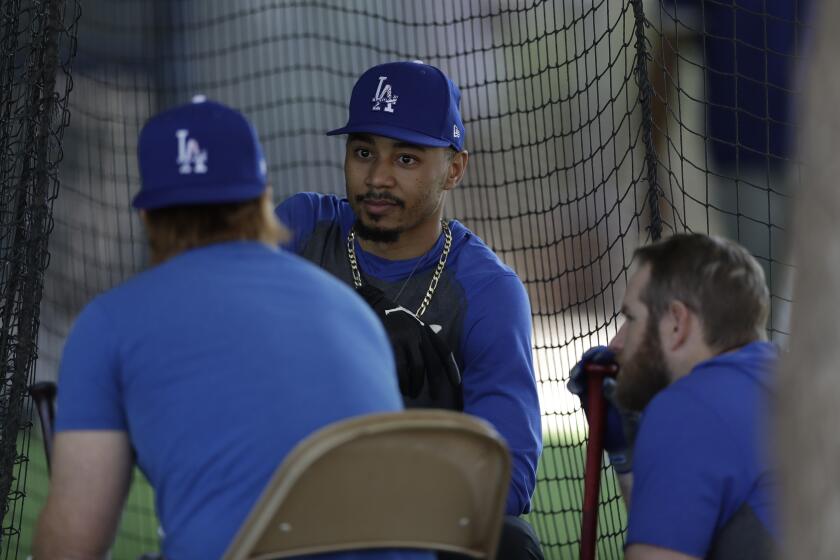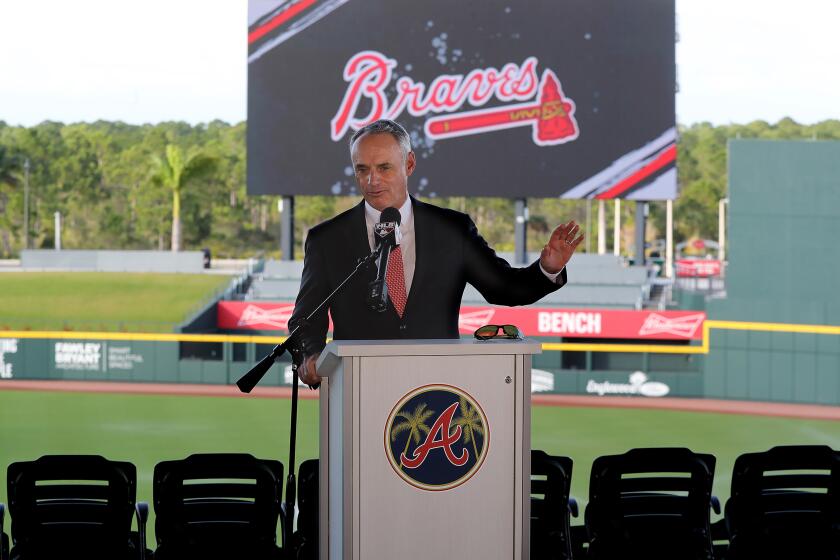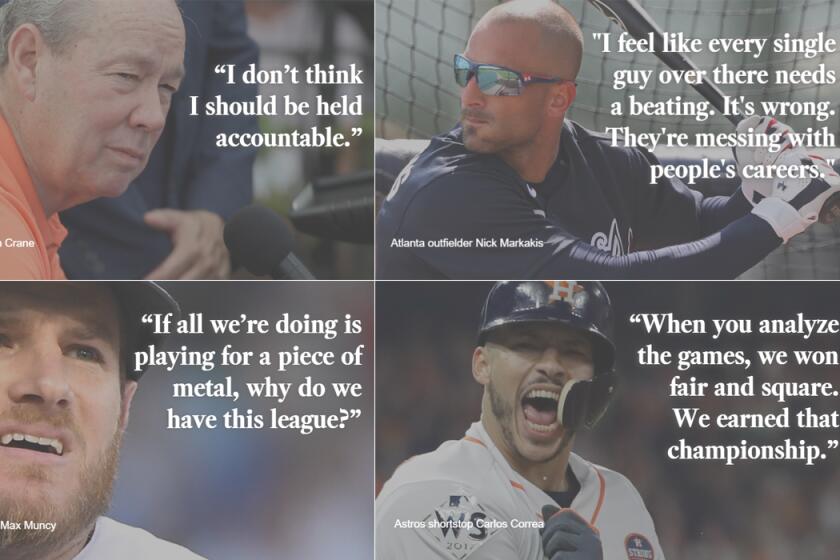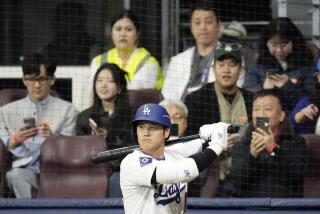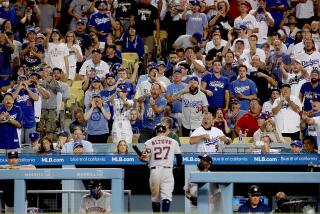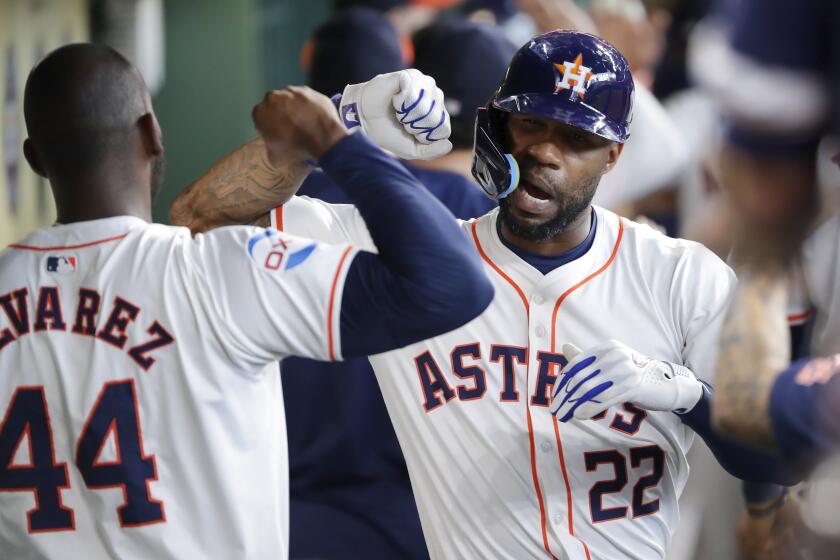Column: Yu Darvish suggests the Astros would be disbanded had they been a Japanese team
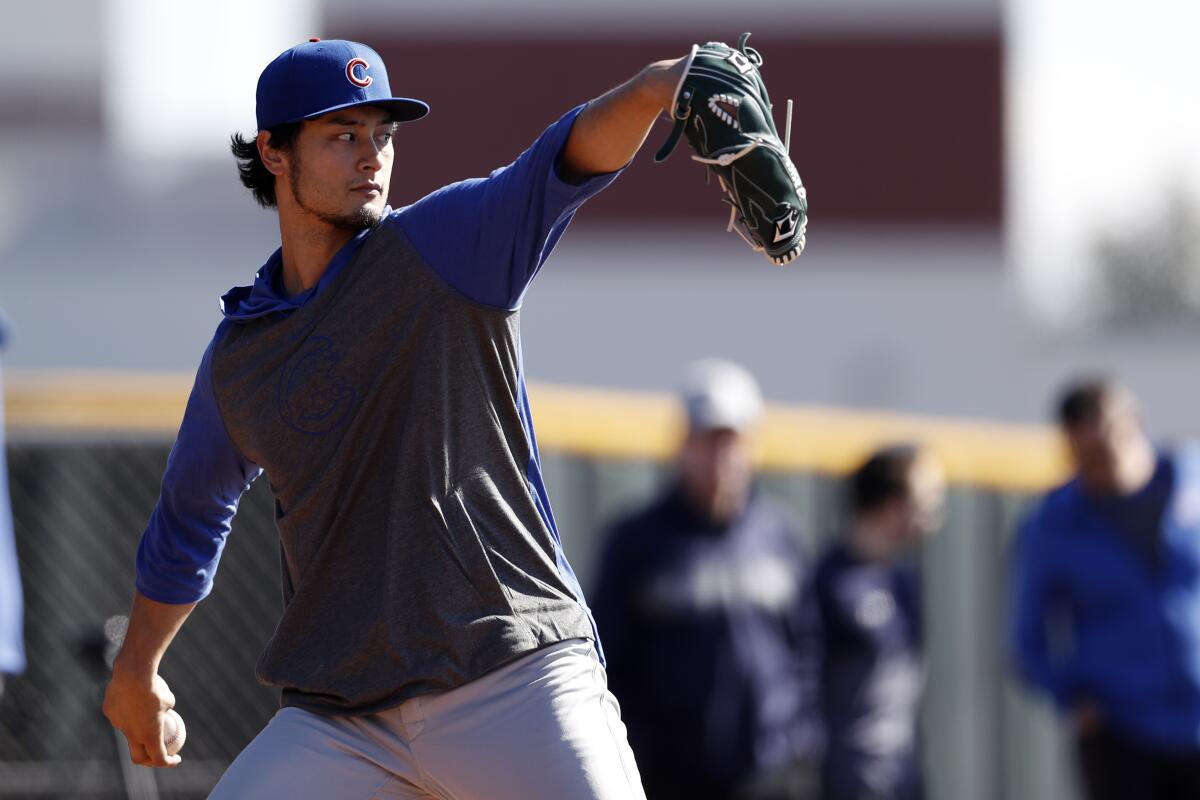
PHOENIX — Yu Darvish tried to picture how a sign-stealing scandal similar to the Houston Astros’ would have unfolded in his home country.
Initially, he couldn’t.
“I can’t even imagine,” he said in Japanese.
Darvish chuckled. Seated in a metal chair in the middle of the Chicago Cubs’ spring-training complex, he tilted his head as he gathered his thoughts.
“Wouldn’t the organization be disbanded?” Darvish said. “The organization would be disbanded, right?”
He wondered aloud about the effect on Nippon Professional Baseball, which has two six-team leagues.
“Well, without a doubt, the team would be stripped of its title,” Darvish said.
On the day of the Dodgers’ first full-squad workout, players were continually asked about the Astros’ sign-stealing scandal and accompanying fallout.
Shellacked in each of the two starts he made for the Dodgers in the 2017 World Series, Darvish was perhaps the most affected player by the Astros’ systemic cheating.
In his view, if the hypothetical scenario in Japan represented one extreme on the spectrum of justice, Major League Baseball’s relatively minor punishment of the Astros marked the opposite. He called for a more balanced resolution to a controversy that has rocked the sport.
Darvish acknowledged the downside of a society like Japan’s, in which celebrities linked to drug use, extramarital affairs or even tax evasion often vanish overnight from public life.
“I always felt uncomfortable about that,” Darvish said. “I don’t think that’s a good custom. Living in this world, we all just want to be happy. And I don’t think it is right to be denied that opportunity over a single mistake.”
Darvish, who was born to a Japanese mother and an Iranian father, has firsthand experience with that aspect of the culture. When he was an 18-year-old rookie with the Nippon-Ham Fighters, he was photographed smoking in a gambling parlor. The minimum age for smoking and gambling in Japan is 20.
The news was widely reported. Darvish’s reputation suffered.
As part of his punishment, Darvish was ordered by a team official to write an essay reflecting on his mistake. He didn’t have a problem with that. What he did have a problem with was being told to write a different essay on the same subject every day for a month.
By comparison, Darvish said, “America is very tolerant of mistakes.”
In his first major league season, in 2012, his teammates on the Texas Rangers included Josh Hamilton, a recovering drug addict who was the American League’s most valuable player two years earlier.
“When I saw the generosity of spirit of the people who live in America and their willingness to give second chances, it had a very wonderful effect on me,” Darvish said.
And when allegations of the sign stealing first surfaced in November, Darvish wasn’t as upset with the Astros as he was disappointed in them. Darvish said the revelations didn’t change how he viewed the results of the 2017 World Series, reasoning that recovering from that defeat made him better, the person he is today.
The accusatory questions directed at MLB commissioner Rob Manfred painted a picture of a sport that lost the trust of not only the public, but also its players.
This was how Darvish continued to view the controversy until last week.
His thoughts changed when he saw a television interview in which Astros shortstop Carlos Correa said Dodgers outfielder Cody Bellinger should “shut the [blank] up” because he was unfamiliar with the details of the Astros’ sign-stealing program.
Correa was responding to remarks Bellinger made about how Astros second baseman Jose Altuve stole an MVP award from New York Yankees outfielder Aaron Judge in 2017. Correa was adamant Altuve didn’t have signs relayed to him while he was hitting.
“I wasn’t bothered too much about the whole thing, but when I saw that, I thought the players probably aren’t that remorseful,” Darvish said.
Darvish was confounded that Correa could say what he said.
“I understand what they want to say,” Darvish said. “They know the truth about who did it and who didn’t. But they’re all viewed as cheaters right now. If one of them says, ‘This guy didn’t do it,’ the words have no credibility. You don’t know if what he’s saying is true or not. I don’t understand how they can have the confidence to think that what they say would be believed.”
He was particularly bothered by how Correa attacked Bellinger.
“How can they say something like that to a person who has nothing to do with this, who doesn’t cheat, who became the MVP through hard work?” Darvish said.
Darvish reflected on his time with the Dodgers, how the players, coaches and the front office came together in pursuit of the common goal to win a World Series.
“I think it’s disappointing how Correa’s words show not even a trace of respect toward that Dodgers team,” he said. “If I was on the Astros, I would apologize to the Dodgers and I would feel bad for players who lost their jobs as a result of our sign stealing. I think I would say I personally wasn’t worthy of the World Series title.
“There’s not even a hint of that. If anything, it’s like they think that because they’ve been attacked, they should be left alone now.”
Darvish wondered whether culture was a reason.
“America has a culture of not saying sorry,” he said. “I think there are a lot of people who will never admit they’re wrong.”
Darvish was also bothered by how often Astros players treated the commissioner’s report on their sign-stealing practices as a comprehensive document of their misdeeds.
“They had a sign-stealing system others couldn’t even have imagined,” Darvish said. “If they want to hide the truth, I think they’re capable of hiding it easily.”
And he thinks they might have.
Darvish is skeptical the Astros stopped cheating in 2018, as the commissioner’s report stated.
“If they didn’t get caught at that point, they would definitely continue it,” he said. “People who can … maybe not sell their souls, but do something like that, I definitely think they would do it again.”
Darvish believes the 2017 championship is tarnished to where Astros players probably don’t enjoy their World Series rings.
“It would be sad to look at it, wouldn’t it?” he said.
Regardless of how the Astros feel about their jewelry, Darvish said it was important for MLB Commissioner Rob Manfred to vacate the 2017 World Series championship.
The Houston Astros sign-stealing scandal has been a major topic of conversation at spring training. It’s been tough to keep up, but these memes ought to help.
“In the Olympics, in amateur sports, if you cheat, you’re stripped of championships and you’re banned for a certain number of years,” he said.
If MLB doesn’t take similar steps, he thinks teams will still have incentives to cheat. He pointed to how players continued to test positive for performance-enhancing substances after the league instituted a drug policy. He said that is because high-performing players are financially rewarded, regardless of whether they have flunked screenings.
“MLB has to take the title,” he said.
If the league doesn’t, Darvish believes the controversy will continue.
“If that doesn’t happen, this doesn’t end,” Darvish said. “Fundamentally, that’s what everyone is really talking about.”
A trophy valued by many people was stolen. The thieves shouldn’t be allowed to keep it. Now, that’s a concept that doesn’t require translation.
More to Read
Are you a true-blue fan?
Get our Dodgers Dugout newsletter for insights, news and much more.
You may occasionally receive promotional content from the Los Angeles Times.

